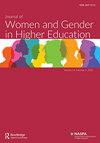从厌恶女性的煽动者到“枪手之一”:如何帮助大学性暴力预防对抗男性至上主义?
Q2 Social Sciences
Journal of Women and Gender in Higher Education
Pub Date : 2022-10-02
DOI:10.1080/26379112.2022.2132951
引用次数: 3
摘要
男性至上主义意识形态对大学性暴力预防工作构成多重威胁。与其他男性至上主义者一样,厌恶女性的组织在性暴力预防中往往不被承认,但它们可能正在影响大学生。本研究运用反法西斯原则来对抗高等教育中男性至上主义的影响。我们对大学性暴力预防专业人员进行了17次半结构化访谈,促使他们对带有厌女主义incel影响的隐性警告信号的场景做出反应。对情景和后续问题的回答用于评估参与者对男性至上主义构成的威胁的理解以及对对抗这些威胁的资源的想法,并通过共识编码和主题分析进行分析。只有一些参与者认出了厌恶女性的警告信号。参与者缺乏学习男性至上主义的专业途径,需要通过学习男性至上主义来保护他们的安全和健康。与会者希望获得批判性地分析男性至上主义影响的资源、阻止男性至上主义暴力的工具,以及动员专业网络。研究结果为在高等教育中设计对抗男性至上主义影响的资源提供了关键考虑因素。本文章由计算机程序翻译,如有差异,请以英文原文为准。
From Misogynist Incels to “One of the Shooters”: What Can Help College Sexual Violence Prevention Confront Male Supremacism?
Male supremacist ideologies pose multiple threats to college sexual violence prevention efforts. Misogynist incels, among other male supremacists, are often unacknowledged in sexual violence prevention, yet may be influencing college students. This study applies antifascist principles to confront male supremacist influences in higher education. We conducted 17 semistructured interviews with college sexual violence prevention professionals that prompted their response to a scenario with implicit warning signs of misogynist incel influences. Responses to the scenario and subsequent follow-up questions were used to assess participants’ understanding of threats posed by male supremacism and ideas for resources to combat these threats, analyzed through consensual coding and thematic analysis. Only some participants recognized misogynist incel warning signs. Participants lacked professional pathways for learning about male supremacism and needed ways to learn about male supremacism that protect their safety and wellness. Participants wanted sources that critically analyze male supremacist influences, tools for stopping male supremacist violence, and to mobilize professional networks. The findings inform key considerations for designing resources to combat male supremacist influences in higher education.
求助全文
通过发布文献求助,成功后即可免费获取论文全文。
去求助
来源期刊

Journal of Women and Gender in Higher Education
Social Sciences-Gender Studies
CiteScore
1.40
自引率
0.00%
发文量
20
 求助内容:
求助内容: 应助结果提醒方式:
应助结果提醒方式:


